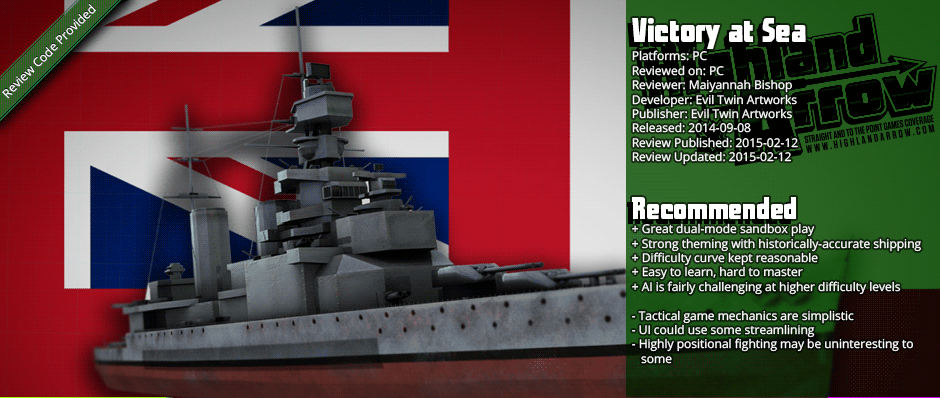

Victory at Sea is a dual mode strategic/tactical sandbox sea wargame developed and published by Evil Twin Artworks. It's rare to get a naval wargame that really tries to be something of complexity these days, as opposed to an arcade game, so Victory at Sea is one I've had on my "really should play this" pile for a while now. I can't say I'm much disappointed in it, and I found it quite compelling. There might not be much competition to compare it to, but I nonetheless had quite a bit of fun.
Victory at Sea has a quite apt dual-mode gameplay style
Gameplay essentially has three different granularities: an overall sandbox sort of strategic view, a battle "tactical" view, and a in-battle camera view. In the strategic view, you are navigating your fleet to various points, evading patrols or engaging them as you please, given a series of objectives by the headquarters at docks, or occasionally by command fleets on the overworld. It is very reminiscent of the overworld of Mount & Blade: Warband, and that is hardly a negative comparison. You have some docks, which are essentially the towns, and then a variety of fleets, some of which are simply patrols, or merchant marine, others are more named and powerful fleets lead by the admirals of your allies - or enemies. The theming is strong, resembling the kind of interface one might imagine a modern chart would be drawn out on, though perhaps not a historical one, to be fair, and it also includes occasional date-appropriate recordings of historical events as they happen, such as the Japanese attack on Pearl Harbour and the like. In the combat view, reached when you intercept an enemy fleet or they intercept you, or you attempt to assault an enemy port, you have two separate modes, a zoomed out and abstracted tactical view that allows you to strategically issue orders to the entire fleet in a fairly intuitive way, or a more zoomed in tactical view, which allows for finer control of a single ship.
The meat of the game is in the combat view, where positioning of the ships is essential to victory. This is both a highly-tactical system and a fairly simple one, which makes it a system that's easy to learn, since the movement is fairly intuitive simply by controlling a throttle and using mouse-clicks to change ship headings, and difficult to master, since the exposure of the ship, firing arcs of your weapons, and the ability to properly cover ships you might be defending are paramount.
That combat simplicity is both bane and boon to Victory at Sea
The weapons themselves are modeled fairly reductively - fore/aft or starboard/port batteries for the most part, though they are reasonably accurate to the armament of the ships and their relative powers compared to one another. However, while these simple firing-arc style weapon mechanics keep things easy to grasp, they are likely more simple than many coming to Victory at Sea may desire.
A fair few people I know likely would write Victory at Sea off for such simplicity. It's a matter of the position on that proverbial spectrum that Victory at Sea falls upon - a lot of people that might be attracted to this genre would likely expect a simulator, and Victory at Sea is not a simulation, rather it is a sort of light-to-moderate depth open-ended strategy game at heart, a sandbox ocean to rove across and help win that fantastical war effort upon. Indeed, if you find yourself interested in that idea of a game, you'll probably have a lot of fun in Victory at Sea, the problem here comes more with the certain expectation some had of it being a simulator. This is no casual mobile game, though. It has a moderate skill ceiling, and it rewards tactical cunning.
One thing I noticed prominently was the reasonable difficulty curve
Among the bigger problems I had with that overworld in Mount & Blade: Warband is that the difficulty could be rather unforgiving at the start, even for someone with deep knowledge of the game, as my hundreds of hours with it gave me. Its probably a contributing factor to the game feeling simpler to people, however, the difficulty curve in Victory at Sea is actually kept fairly reasonable, with the ships of enemy fleets kept usually within a modest closeness to you own, but at the same time with provisions to make it challenging if you decide to get overambitious, such as powerful and battleship-laden port defense fleets, and the personal fleets of historical Admirals and Commodores as well as an artificial intelligence that does a good job of coming to its own aid, which makes reinforcements a constant threat hanging over your head if you engage an enemy in hostile territory or otherwise other-extend your fleet.
The AI is not super challenging on the normal mode, however when you go to the harder modes it presents a moderate challenge, especially if you are not taking direct control of ships to maximise the ability of your fleet. This is actually why the simpler gun arc mechanics do not bother me as much as I imagine it might others, because of the amount of micro you need at the higher level means having more complex gun mechanics could very easily become unwieldy, whereas the system in place finds a happy medium between skill and complexity, especially in hairier engagements with many many ships.
If there's any big misgiving I have about the game,
it feels like there could be more here than there is presently
Perhaps dear reader, you might think to yourself that it sounds like I might be missing out on describing more of the game, but unfortunately, I have pretty much described the majority of it. There's several historical factions - the US Navy, the British Royal Navy, the Kreigsmarine, and such, each with their own selection of quite historically-accurate ships, but while theres three maps, that's about all I've left out. As I mentioned previously, there are merchant marines to defend out in the fleet, but unlike other games I am henceforth vowing to stop bringing up, you have no option to bring supply ships yourselves for trade or resupply. Indeed it could easily have been made into a fairly-simple but effective game mechanic to allow repairs while at sea if you had a supply ship containing repair parts, but you won't find that here unfortunately.
That is essentially what I think this game needs most, in one case study example: it needs more to do on that overworld map other than just finding additional ships to interdict, going to the aid of your allies, and assaulting. Merchant marine is certainly one very pertinent example, but reconnaissance and the like could also be added, especially since the game does feature submersibles. Since you start at what's a hair off a flag officer rank, some agency to create your own missions or have pseudo-diplomatic chats with other fleets would have been neat.
The user interface is great-looking and very functional,
but a bit clunky in places and could use some improvement
The other principal complaint is a bit of a nit-picky one, but I wouldn't be the kind of skeptical critic I like to fancy myself if I wasn't furiously picking at a nits like an uncommonly-obsessive tailor if I didn't. Some people might be somewhat surprised by that criticism since the user interface is actually fairly strong. It has a lot of the indications of it's engine as it were, but the options are functional, the menus in the main menu are fairly well-presented, and the game isn't so complex as to need a big and comprehensive rebinding system. My chief grievance here is that many of the secondary functions take a remarkable amount of clicking around to accomplish. Let us say by way of example that I have just purchased a brand-new Hood-class battleship to be the lead vessel of my fleet and I wish to assign the captain I created that represents myself to that ship. To do so, I have to click to the main in-game menu, then Fleet Information, then click a button to Reassign Captains, scroll to the new ship at the end of the list, click that captain that came with it, then scroll to the vessel that my player captain is on, then click that one. Now, that isn't as bad as the clicking around anything in the original Borderlands needed for example, where I briefly considered imbibing nuclear waste so I could grow a third hand and wished dearly for hotkeys or a less contrived interface, however all the same its a lot more clicking about than is really necessary for the task, and it could have been designed fairly better. As these tasks are something that you do not do very often, it is not a game-breaker, but it is irritating nonetheless.
It might seem like I'm getting a bit down on this game and perhaps I am, but it is because I had a lot of fun with Victory at Sea, easily one of the games that's sucked the most of my time recently, and it falls so short of what I would consider perfect for this genre. Some more ships, that interface fixed up, some more to do on the overworld, and perhaps a bit more diplomacy and customisation, and this game could have been perfect. As is, it is merely great, and if you take that as a condemnation, well, you're very silly.


